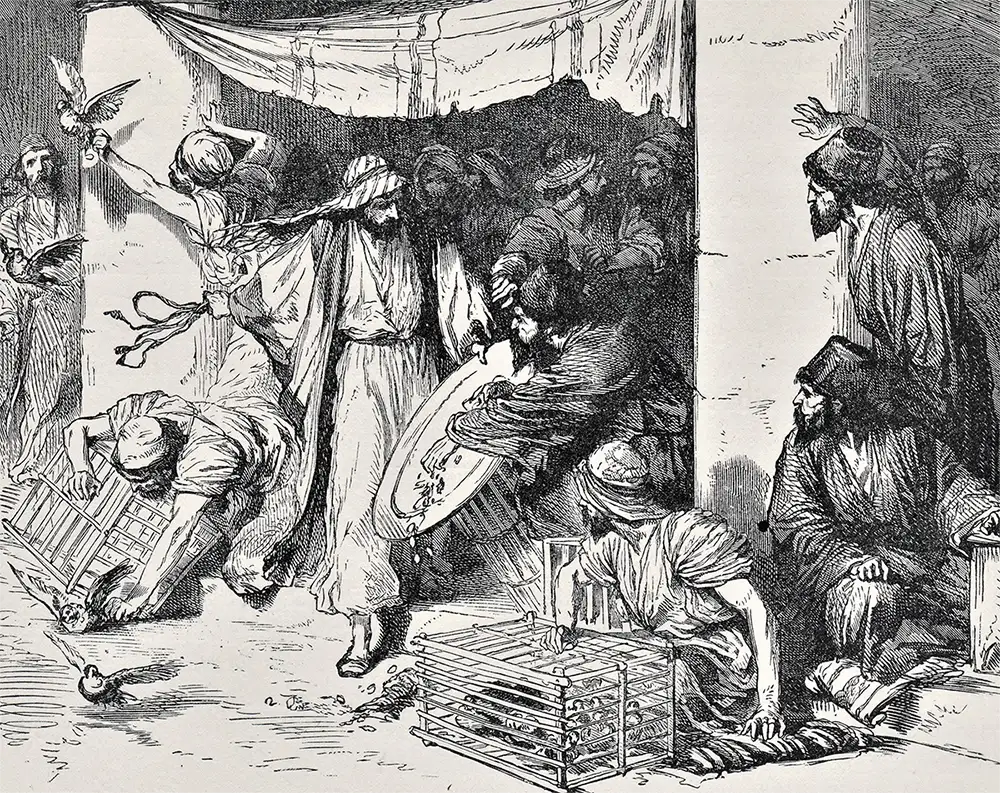 Christopher Thompson
Christopher Thompson



Little did the priests and rulers realize the solemnity of the work which it was theirs to perform. At every Passover and Feast of Tabernacles, thousands of animals were slain, and their blood was caught by the priests and poured upon the altar. The Jews had become familiar with the offering of blood, and had almost lost sight of the fact that it was sin which made necessary all this shedding of the blood of beasts. They did not discern that it prefigured the blood of God’s dear Son, which was to be shed for the life of the world, and that by the offering of sacrifices men were to be directed to a crucified Redeemer.
Jesus looked upon the innocent victims of sacrifice, and saw how the Jews had made these great convocations scenes of bloodshed and cruelty. In place of humble repentance of sin, they had multiplied the sacrifice of beasts, as if God could be honored by a heartless service. The priests and rulers had hardened their hearts through selfishness and avarice. The very symbols pointing to the Lamb of God they had made a means of getting gain. Thus in the eyes of the people the sacredness of the sacrificial service had been in a great measure destroyed. The indignation of Jesus was stirred; He knew that His blood, so soon to be shed for the sins of the world, would be as little appreciated by the priests and elders as was the blood of beasts which they kept incessantly flowing.”
You can read the Desire of Ages in its entirety online for free by searching for Desire of Ages at whiteestate.org

The Jews used the occasion of the Passover to overcharge eager worshippers for use of the temple coin. The unique temple coin was the only currency accepted for offerings in the temple. The only currency exchange that provided the temple coin was — surprise, surprise — run by the priests and located inside the temple. The priests were price-gouging with an exorbitant exchange rate and overcharging for animals that could be offered as sacrifices. Can you think of a specific example of abuse of power in the present-day that you believe makes God angry?

Notice the response of the religious leaders. From that point on they were looking for a way to kill Jesus. It’s important to note that this is the start of what we call “Holy Week.” It was the very last week of Jesus’ natural life. This event took place on Sunday. It is likely that Jesus has long been aware that, His life will end in a brutal sacrifice for the salvation of humankind. Yet, it’s significant that the spark that lit the fire was defending people from abuse.

Many scholars believe that the account of the temple cleansing that is recorded in John’s Gospel is a separate event than the one that is mentioned in the other three. John’s account took place at the very beginning of Jesus’ public ministry, and the account recorded in the other three gospels took place at the very end. It’s important to note that Jesus was fully invested in ridding the temple of this injustice. What example of injustice burns you up with anger whenever you see it? What injustices are you committed to fight against?

As Jesus was disrupting this annual price-gouging event of the moneychangers He quoted two important passages from two major prophets. The text in Isaiah is important because it describes God’s desire to allow even groups of people who were previously rejected to be accepted in the temple among the chosen people (cf. Isaiah 56:3-4, Deut.23:1-3). In Jeremiah 7 we have a similar rebuke of the religious leaders. God’s expectations of leaders remain; from the period of the patriarchs and prophets until today.

Ellen White (The Desire of Ages, p. 163) paints the picture of that moment after Jesus cleared the temple.
“When they fled, the poor remained behind; and these were now looking to Jesus, whose countenance expressed His love and sympathy. With tears in His eyes, He said to the trembling ones around Him: Fear not; I will deliver thee, and thou shalt glorify Me. For this cause came I into the world. The people pressed into Christ’s presence with urgent, pitiful appeals: Master, bless me. His ear heard every cry. With pity exceeding that of a tender mother He bent over the suffering little ones. All received attention. Everyone was healed of whatever disease he had. The dumb opened their lips in praise; the blind beheld the face of their Restorer. The hearts of the sufferers were made glad.”
In which ways can you help extend Jesus’ ministry of compassion in your local church?

“Yet, love of the helpless one, love of the poor and the stranger, are the beginning of brotherly love. To love one’s flesh and blood is no achievement. The animal loves its young and cares for them. The helpless one loves his master, since his life depends on him; the child loves his parents, since he needs them. Only in the love of those who do not serve a purpose, love begins to unfold. Significantly, in the Old Testament, the central object of man’s love is the poor, the stranger, the widow and the orphan, and eventually the national enemy, the Egyptian and the Edomite. By having compassion for the helpless one, man begins to develop love for his brother; and in his love for himself he also loves the one who is in need of help, the frail, insecure human being. Compassion implies the element of knowledge and of identification. “ou know the heart of the stranger,” says the Old Testament, “for you were strangers in the land of Egypt;. . . therefore love the stranger!” (Erich Fromm, The Art of Loving, 48).

Make a list of the ways in which you might enlist the people in your circle in the fight against injustice. Highlight specific church-oriented activities that promote justice. Share that list with your friends and family and make a commitment to putting some of those strategies into practice.